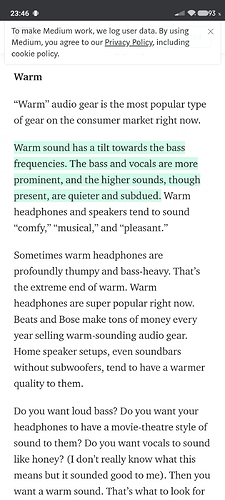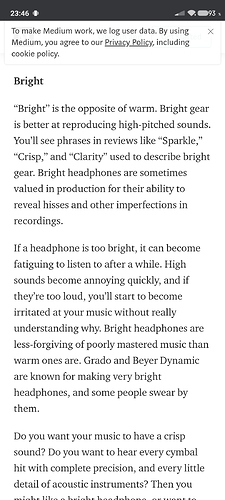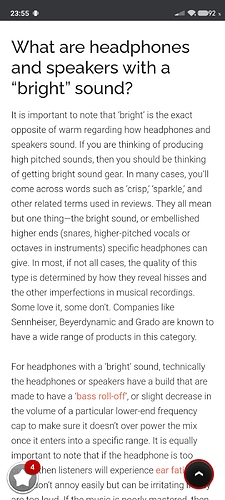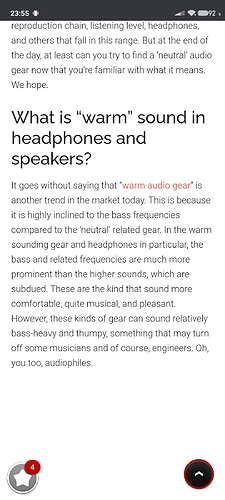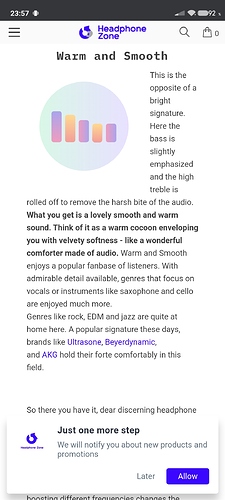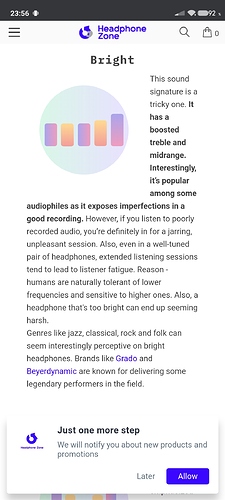Mmhhh, I don’t know about that.
I mean, audio vocabulary is hard enought without weird fusions…
I don’t see how he figures its the true opposite… bright governs the treble and upper mids warm governs the bass and clarity of the mids. The opposite of bright is Dark. While dark and warm are similar warm is less tilted.
There isn’t a singularly accepted definition for a lot of these terms. For example the definition given here defines “warm” without regards to the amount of treble.
" Warm - Good bass, adequate low frequencies, adequate fundamentals relative to harmonics. Not thin. Also excessive bass or mid bass. Also, pleasantly spacious, with adequate reverberation at low frequencies. Also see Rich, Round. Warm highs means sweet highs."
But yeah it’s unusual to describe something as being simultaneously being warm and bright.
First off… lets not get aggressive shall we? Secondly, both sites you mention miss Dark as a signature of sound. In the first one you posted one of his comments even mentions that he fails to mention Dark. While yes it can be technically considered a form of opposite Dark is the true opposite to Bright as it’s the absolute polar opposite. While treble is raised and potentially upper mids dark has that frequency dropped well below neutrality.
secondly, this ^
I’m not agressive, why do you say that? If you felt that way it wasn’t my intention but… honestly? You’ve been here for a couple of months and suddenly you’re an expert in everything. I see two problems here, to explain things that you could say in two sentences you use fourteen and is easy to get lost in all that rethoric. Sometimes things are simpler than that. I know that I’m not qualified to give advise in most of audio related stuff but at least I don’t try to confuse anyone with the basics. I know you mean well but you should reconsider that your knowledge might not be as advanced as you’ve become to believe.
Again I say this as a forum colleague and mean no disrespect.
Nowhere have I made this statement nor have I attempted to make myself appear to be an expert. I ask questions all the time and learn all the time in this hobby. This hobby is extremely subjective even among terminologies. My knowledge is very limited of which I fully accept that. My statements and comments are based just like anyone else’s based on any experience I may have or opinions based on what I have heard or know.
As far as the terminologies… If I were to say explain the dt 990 I could say okay the lows have warmth along. the mids are recessed. but the treble is bright with sparkle or rather its a V signature. This is what I mean when I say I don’t find them opposites
When you say “do you want me to continue” this can be taken extremely aggressively. Even your last comment here was aggressive while it can be constructive criticism based on your opinion it can be still taken the wrong way… I will choose to take it as an opinionated response.
now now, everyone, can’t we all just get along?
David…the ‘do you want me to continue’ is snarky…but I suspect you meant it tongue in cheek.
hmmm…I wonder if you can use the 4.4mm pentacon out on the original Zen combo and go directly into the new Zen CAN amp? $139 DAC vs the $250 Drop is being silly about.
Anyway back on the topic here! I do look forward to hearing zeos’s thoughts on this dac. Sounds interesting… I just am not sure on the price. Not sure if its worth really over the ifi zen dac honestly…
You can, if you are talking about the 4.4mm on the back of the OG Zen Dac, you can both use it to output the dac to an amp or use it to control powered speakers.
especially if you can output from the original via the pentacon into the new Zen CAN amp.  Seems the extra $110 is a waste unless you really need colors to match.
Seems the extra $110 is a waste unless you really need colors to match.
I mean, you gotta admit… it looks pretty sharp as a stack though lol.
absolutely…but it would also look funny having amp on amp action going!
From a technical perspective, what exactly is the point of having balanced a line out over a 4.4 mm cable? Your not getting noise reduction like you would with XLR. I’m wondering if this DAC would be better if they didn’t bother with balanced and invested the extra resources into the rest of the design
You get the same “noise reduction” you do over XLR, not that it’s significant because cable runs are short.
The primary advantage is just retaining the balanced/differential signal from the DAC to the AMP.
4.4 pentacon is a better cabling standard for a headphone wire, it has a ground which means you can safely have a cheap balanced to SE adapter. For component to component interconnects, in the IFI Zen stuff it’s just about the physical dimensions of the connector.
Ok, ifi have posted a answer about the difference between the Zen Dac and the Signature.
